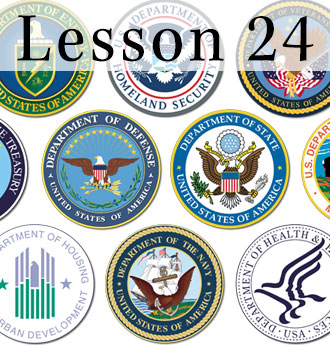Lesson 24: How Are National Laws Administered in the American Constitutional System?
cabinet The group of advisors to the president composed of the heads of the departments of the executive branch and certain other officials. Cabinet advice to U.S. presidents is not binding, as opposed to parliamentary systems, where the consensus of cabinets is said to bind prime ministers.
civil service Employment in federal, state or provincial, and local governmental agencies. The civil service was formed in an effort to reduce political patronage and promote professionalism in government.
independent agencies Administrative organizations located outside the structure of executive departments.
patronage Support, often financial, given by a person or institution to a person, group, or institution in need.
quasi–judicial powers Actions of an agency, board, or other government entity in which there are hearings, orders, judgments, or other activities similar to those of courts.
quasi–legislative powers Having a partly legislative character by possession of the right to make rules and regulations having the force of law.







